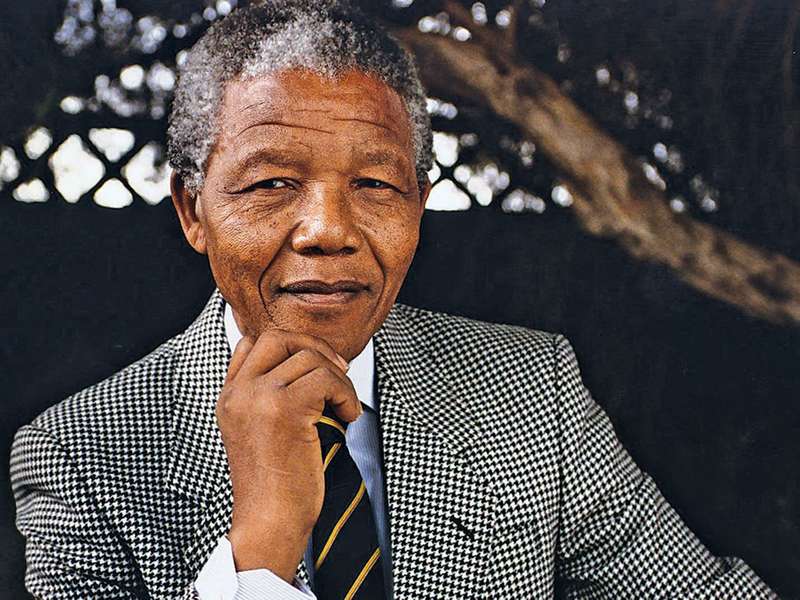
01 Jul July Newsletter

NELSON MANDELA INTERNATIONAL DAY
Saturday, July 18th, 2020
South Africa had its first Black president in 1994… A nation where white people were a minority didn’t have a Black president until the end of the 20th century. Nelson Mandela rightfully earned this spot in history after years of fighting racism.
In 1948, apartheid became a legal policy that enabled the white population in South Africa to practice institutionalized racial segregation. During apartheid, mixed marriages were banned; Black people were evicted from their homes; nonwhites had to carry documents that authorized their presence in white areas (“pass laws”). More than 80% of South African lands belonged to the white minority.
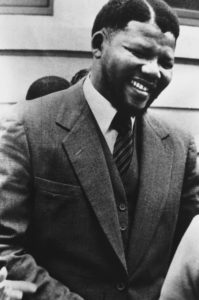 In the meantime, Nelson Mandela had joined the African National Congress (ANC), a Black-liberation group. He defied the pass laws; wrote the Freedom Charter, a document that called for a nonracial democracy; and traveled all over the country to spread his message. His anti-racist activism made him popular. The government banned him from traveling and making public speeches. In 1956, he was arrested for treason and then acquitted.
In the meantime, Nelson Mandela had joined the African National Congress (ANC), a Black-liberation group. He defied the pass laws; wrote the Freedom Charter, a document that called for a nonracial democracy; and traveled all over the country to spread his message. His anti-racist activism made him popular. The government banned him from traveling and making public speeches. In 1956, he was arrested for treason and then acquitted.
It was in 1960, after the massacre of unarmed Black people in Sharpeville and the banning of the ANC that Mandela decided to drop his nonviolent protest. He founded Umkhonto we Sizwe, the military wing of the ANC. He organized a three-day national workers’ strike. He was arrested for leading the strike. Two years later he was accused for treason and violent conspiracy.
In 1964, Nelson Mandela was sentenced to life in prison. He spent 27 years incarcerated where he was treated poorly. The government offered to release him from jail if he renounced armed struggle to which Mandela said no.
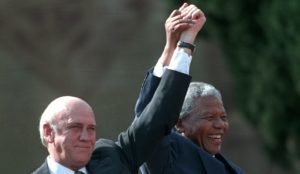 Nelson Mandela had already gained a lot of support from the Black population in South Africa. There was international pressure to release him. When President de Klerk took office, he released Mandela from prison.
Nelson Mandela had already gained a lot of support from the Black population in South Africa. There was international pressure to release him. When President de Klerk took office, he released Mandela from prison.
Mandela became the president of the ANC. He negotiated with President de Klerk the end of apartheid and the beginning of a nonracial democracy. They both won the Nobel Peace Prize for their efforts in ending racial segregation.
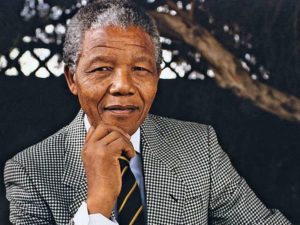
In 1994, Nelson Mandela won the first multiracial elections. During his time in office he developed policies to improve the lives of the Black population. He signed a new constitution based on democratic values and equality.
Even though he didn’t look for reelection, he continued to advocate for peace and justice around the world. In 2007, he founded a group called The Elders in order to work towards solutions for the world’s toughest problems.
Mandela died on December 5th, 2013 at 95 years of age. In 2009, the United Nations pronounced the 18th of July, Mandela’s birthday, as Nelson Mandela International Day, to honor his astounding legacy.
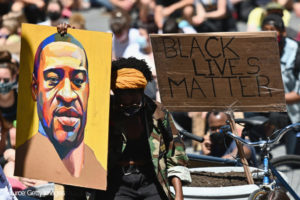 The fight against racism is one we haven’t won yet. In 2020, systemic racism still prevails everywhere. The deaths of George Floyd, Ahmaud Arbery, Breonna Taylor, Elijah McClain, and many others have sparked protests around the world.
The fight against racism is one we haven’t won yet. In 2020, systemic racism still prevails everywhere. The deaths of George Floyd, Ahmaud Arbery, Breonna Taylor, Elijah McClain, and many others have sparked protests around the world.
However, racism doesn’t refer to violent intentional acts only. Racism is a system, which continues to be reinforced in our society through a lot of the mediums we consume throughout our entire lives. Race is a social concept, not a biological one. Race was invented to justify inequality. Race was created to oppress.
Nelson Mandela fought to liberate South Africa. But at the end of the day he needed the help of President de Klerk because he was the one in a powerful position. Racism will not perish until those who hold the power dismantle the systems that keep oppressing People of Color. We all have a responsibility in this fight and it starts with educating ourselves and taking an anti-racist stand in every moment of our lives.
“For to be free is not merely to cast off one’s chains, but to live in a way that respects and enhances the freedom of others.”
– Nelson Mandela –


